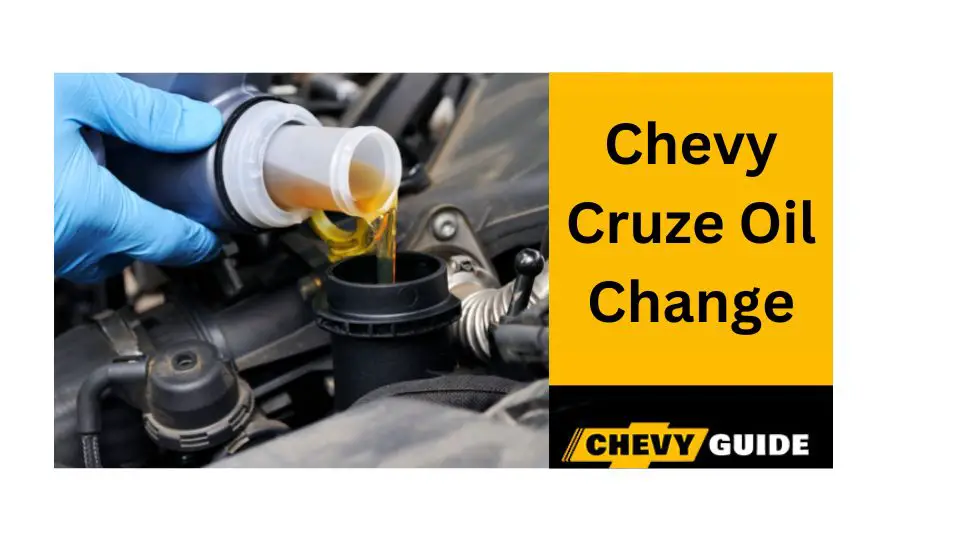Engine oil is one of the most critical parts of your engine. It lubricates the pistons, valves, and moving parts so they move smoothly and don’t wear down prematurely.
Oil also helps cool the engine by carrying away heat from its internal combustion process. Changing it regularly ensures your engine is well protected and prevents premature engine wear. This article will look at the oil change interval for a chevy Cruze.
Recommended Oil Change Interval for Chevrolet Cruze
Chevrolet recommends your change your engine oil every 3000 -5000 miles or once a year depending on where or how often you drive your Chevy Cruze.
If you drive your car under severe conditions, such as frequent towing or hauling heavy loads, it’s recommended that you change the engine oil and filter more often.
The Importance of Changing the Oil on your Chevy Cruze
Changing the oil on your car is one of the most important things you can do to keep it running smoothly.
The engine lubricates moving parts, cools itself, and cleans away dirt and debris that would otherwise wear down your engine components over time.
If you don’t change the oil regularly, it can cause premature wear on vital engine parts like pistons and valves which could lead to costly repairs down the road.
Signs Your Chevy Cruze Needs an Oil Change
Other than the recommended schedule there are some other signs that it may be time to change the oil in your Cruze, these include:
Low Oil Level:
This is pretty straightforward when the engine oil reaches the recommended level it will be time to change it.
If you have a dipstick, you can check the engine oil by pulling out the stick and wiping it off with a rag. You should then reinsert it into the socket and pull it out again once more.
The oil level should be between the two marks on the stick. If not add more oil until it reaches this mark before driving any further.
New or Increased engine Noise:
If you have noticed an increase in engine noise, particularly a rattling or knocking sound coming from the engine then it may be time to change your oil.
This is likely due to old or dirty oil being pumped through the system. The problem will only get worse if you continue driving with this issue so it’s best to stop and check out what is going on.
Exhaust smoke (white):
If you notice white smoke coming from the exhaust pipe, then it’s time to change your oil. This can be an indicator of a problem with your engine and should not be ignored. If you see black smoke it may mean that there is something wrong with the engine or filters so consider having a mechanic take a look at things right away.
Increased Engine Temperatire:
Another common sign that your oil needs changing is increased engine temperature but usually not drastically and you will also notice engine performance feels sluggish than normal.
Chevy Cruze Oil Type
Now, lets look at the recommended oil for a chevy cruze, SAE 5W-30 is the best choice for a chevy cruze. This oil is made with synthetic base stocks and has detergents that clean your engine, keeping it running smoothly for longer.
It also protects against rust and corrosion which is important in places where there is a lot of rain or humidity like Florida or California.
Where to Get an Oil Change?
There are a couple of options when it comes to changing your oil, here are the main ones
Chevy Dealership:
A dealership is a great place to get your oil changed because they often have newer equipment and can do it quicker than other options. The only downside is that it can be expensive! You should expect to pay more for an oil change at a dealership.
Independent Auto Repair Shop:
An independent auto repair shop is another option for getting your oil changed, these places often have older equipment but can still get the job done. They are also much more affordable than a dealership, which is why many people choose to go to an independent repair shop. You can expect to pay less at most independent auto repair shops.
DIY
You can also do it yourself! This is a great option if you’re a DIY kind of person. It can be cheaper and it’s always good to know how to do your own repairs.

Tomas is a retired Chevy Auto Technician that brings decades of hands-on experience and expertise to the table. He’s also a father to two incredible daughters. He enjoys using his knowledge and experience to help you solve and find reliable information on Chevrolet vehicles. Whether it’s troubleshooting engine problems or providing tips for maintenance, Thomas is committed to helping Chevy owners keep their vehicles running smoothly and safely.




